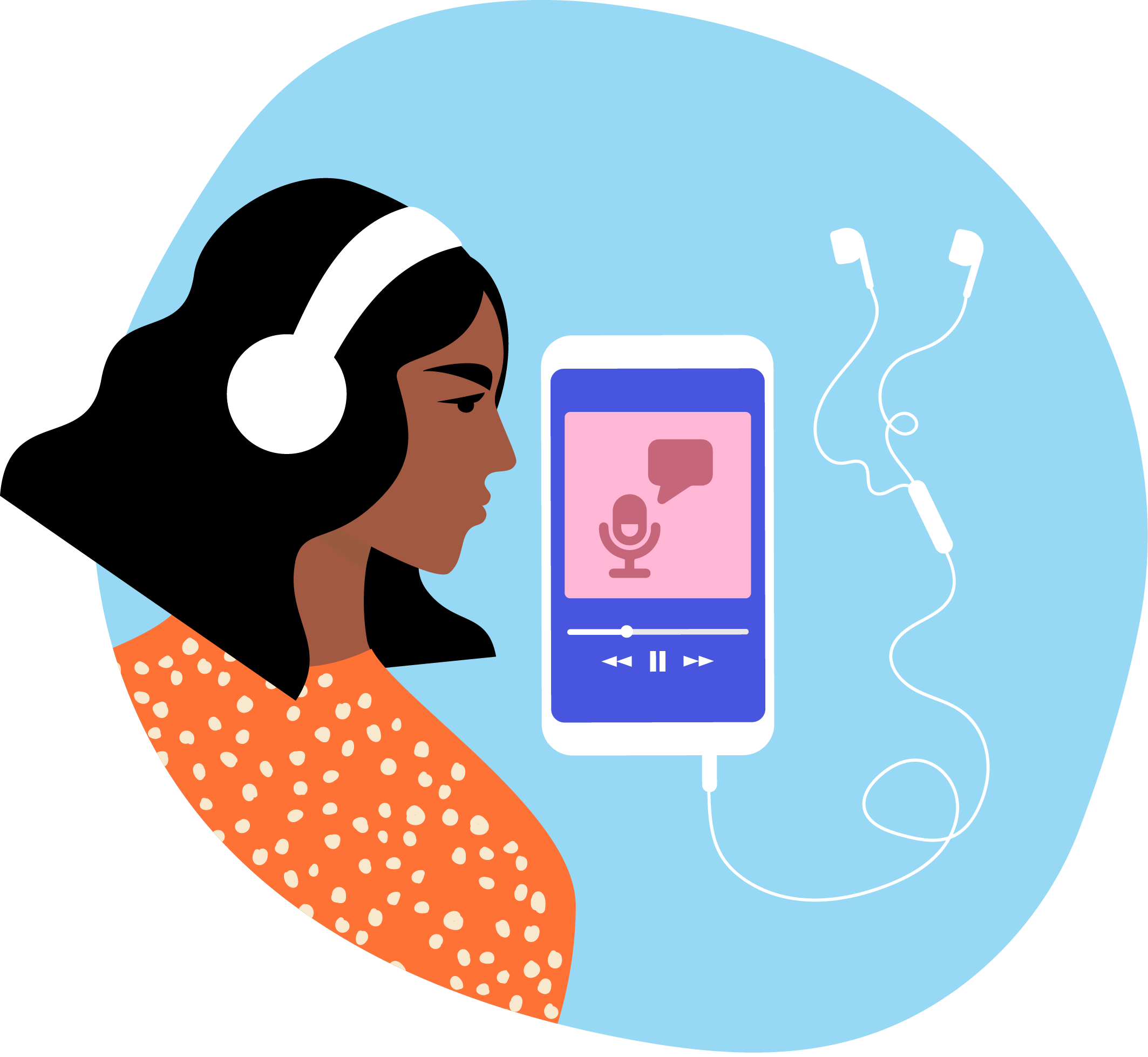00:00:03
Bienvenidas a “Hablemos del tema”, un podcast presentado por Laaha
00:00:13
Laaha es una plataforma digital abierta donde las mujeres y las niñas
00:00:18
pueden obtener información sobre su salud, su bienestar y su seguridad.
00:00:31
Recuerda: todo el contenido que ofrece Laaha
00:00:34
se basa en conocimientos científicos y sus fines son exclusivamente educativos.
00:00:41
No pretende reemplazar el asesoramiento o el tratamiento médico profesional.
00:00:53
Mi nombre es Mariam, y estoy aquí para compartir con ustedes
00:00:57
algunas ideas sobre cómo hablar con su hijo o hija,
00:01:00
sobre sexo sin sentimientos de incomodidad o verguenza.
00:01:05
Para muchas de nosotras, hablar de nuestro cuerpo
00:01:08
y en particular, de nuestras partes sexuales u órganos reproductivos
00:01:11
puede resultar incómodo y tal vez incluso vergonzoso.
00:01:15
Hablar de sexo también puede hacernos sentir así.
00:01:19
Esto tiene que ver principalmente con lo que aprendimos
00:01:22
sobre nuestros cuerpos y sexo cuando éramos más jóvenes.
00:01:26
Toda la información que aprendimos de nuestras madres, padres,
00:01:30
otras personas adultas en nuestra vida, y sobre todo, la forma cómo lo aprendimos.
00:01:35
Cuando estos temas se han discutido de una manera que comunica vergüenza,
00:01:40
incomodidad o no se permite discutirlos en absoluto,
00:01:43
aprendemos a asociarlos con sentimientos de vergüenza.
00:01:47
Este suele ser el caso de las mujeres y las adolescentes porque,
00:01:51
dependiendo de nuestra cultura o religión, a menudo también se nos enseña
00:01:55
que los cuerpos de las mujeres son algo que debemos temer y controlar,
00:01:59
y que el sexo es algo vergonzoso y malo.
00:02:02
Como madre, es posible que también recuerdes la experiencia de
00:02:06
cómo reaccionaron las personas cuando tu cuerpo comenzó a cambiar,
00:02:10
durante la adolescencia.
00:02:12
Estos cambios a menudo vienen con la atención, interés, o curiosidad,
00:02:16
de niños y hombres, quienes quizás pueden haberte hecho sentir asustada,
00:02:21
vulnerable o avergonzada sobrer tu cuerpo.
00:02:24
Los cambios corporales también pueden venir acompañados de normas y restricciones
00:02:29
sobre cómo vestirse, con quién pasar el tiempo y cuáles actividades realizar.
00:02:34
Recordar cómo estos cambios afectaron la percepción sobre ti misma,
00:02:39
durante la adolescencia, por como te veían las demás personas,
00:02:43
y cómo esto impactó en tus actividades diarias,
00:02:46
puede implicar que también estés preocupada a que tus hijos e hijas vivan lo mismo.
00:02:51
Como madre, es posible que quieras que tus hijos e hijas, tanto hombres como mujeres,
00:02:56
crezcan con un mayor nivel de comprensión sobre sus cuerpos y su sexo.
00:03:02
También es posible que desees que tu hijo e hija reciba información correcta sin avergonzales.
00:03:08
Es importante que sepas, que si la información proviene de ti,
00:03:12
y no de otro niño, adulto, Internet o una fuente no confiable,
00:03:16
tendrás mayores posibilidades de influir en la percepción que tu hijo
00:03:21
o hija tiene de su cuerpo, de los cuerpos de otras personas y de su sexo.
00:03:26
Tu acercamiento a este tema puede influir de manera
00:03:29
determinante en la percepción que tendrá tu hijo o hija.
00:03:33
Una buena manera para comenzar este proceso,
00:03:36
es prepararte para tener estas conversaciones en una forma que comunique
00:03:40
franqueza, comprensión, y confianza, en lugar de asociar este tema con vergüenza.
00:03:46
Es probable que tu hijo o hija comience por iniciativa propia
00:03:50
conversaciones y preguntas sobre las partes sexuales de su cuerpo,
00:03:54
ya sea porque se acerca a ti con una duda,
00:03:57
por preguntas que surgen en su escuela, o porque tú decides iniciar una conversación.
00:04:03
A continuación se presentan algunos puntos que debes tener en cuenta
00:04:07
mientras te preparas para estas conversaciones.
00:04:10
Estas son algunas recomendaciones importantes que pueden ser un apoyo
00:04:14
en el proceso de prepararte para conversaciones sobre cuerpos y sexo:
00:04:19
La curiosidad de tu hijo o hija sobre el sexo es natural y normal.
00:04:24
Cuando hacen preguntas sobre las partes sexuales de sus cuerpos o sobre el sexo,
00:04:28
lo hacen porque están en la etapa crecimiento y quieren saber cómo funciona el mundo.
00:04:34
Cuando los niños y las niñas, hacen preguntas sobre su cuerpo y su sexo,
00:04:38
especialmente en los primeros años de edad,
00:04:40
normalmente preguntan sobre anatomía y biología.
00:04:44
El lenguaje que utilicemos debe reflejar naturalidad,
00:04:47
ser simple, directo y utilizar términos anatómicos reales.
00:04:52
Por tanto, deberíamos prepararnos para utilizar términos reales como
00:04:56
vulva, vagina, pene, esperma, óvulos, etc.
00:05:00
La información no asusta a los niños y las niñas.
00:05:03
Cuando experimentan cambios en sus vidas y nadie se los explica,
00:05:07
es la falta de información lo que les asusta.
00:05:11
Es importante diferenciar entre tu propia incomodidad
00:05:14
al hablar sobre cuerpos y sexo, de la curiosidad de tu hijo o hija.
00:05:19
A menudo aún no tienen las mismas asociaciones sobre cuerpos y sexo
00:05:23
que nosotras tenemos, por lo que en sus primeras aproximaciones al tema
00:05:28
no lo vinculan con sentimientos de vergüenza o miedo, solo curiosidad sobre su cuerpo.
00:05:33
Tienes una oportunidad importante en estas conversaciones para
00:05:36
orientarles desde la confianza, el amor, y la información más apropiada.
00:05:42
Prepáte para que una pregunta pueda generar más preguntas
00:05:46
en el momento de la conversación, o más adelante.
00:05:50
Eso es normal y está bien.
00:05:52
Pregúntales a tus hijos o hijas si tienen otras dudas
00:05:56
y hazles saber que siempre pueden volver a ti si quieren saber más sobre el tema,
00:06:01
recuerdales que pueden confiar en ti para aclarar sus dudas.
00:06:04
Recuerda que no es necesario que tengas todas las respuestas en ese momento.
00:06:09
Si tu hijo o hija te hace preguntas que no te sientes preparada para responder,
00:06:13
está bien decirle que:
00:06:15
te sientes contenta de que te haga esa pregunta y que pronto le responderás.
00:06:20
Podrías decir algo como: “Esa es una gran pregunta y merece una gran respuesta.
00:06:25
Quiero pensar en ello y luego hablaré sobre eso contigo.
00:06:30
¿Dame unas horas, te parece bien?”.
00:06:32
Asegúrate de informarte sobre ese tema, y volver a la conversación sin dejar pasar mucho tiempo.
00:06:38
Podrías reiniciar la conversación diciendo:
00:06:41
“Sabes que me preguntaste el otro día sobre este tema,
00:06:44
lo pensé y me gustaría que continuemos nuestra conversación”
00:06:48
También está bien y es útil hablar con sinceridad sobre tu propia incomodidad.
00:06:53
Por ejemplo, puedes decirle: “Me alegra mucho que me preguntes sobre esto.
00:06:57
Sabias que nadie me habló nunca directamente de estas cosas cuando tenía tu edad?
00:07:02
Este tema es muy importante para tu crecimiento.
00:07:06
Quizás puedes notar que hago una pausa,
00:07:08
no te respondo rápido, o incluso que parezco incómoda.
00:07:12
Eso no es algo que estés provocando tú y no es tu culpa.
00:07:16
Es sólo que es nuevo para mí hablar de estas cosas
00:07:19
en voz alta y estoy pensando en una buena respuesta .
00:07:22
Sus hijas e hijos recordarán cómo se sintieron y cómo les hiciste sentir al tener esas conversaciones.
00:07:29
Tu estado de ánimo al responderles dará señales que
00:07:32
identificaran si es un tema que te hace sentir cómoda o incomoda.
00:07:37
Recordarán el mensaje que recibieron de ti, y también cómo lo recibieron,
00:07:41
como les hiciste sentir.
00:07:43
Interpretarán si se sentieron en confianza o no.
00:07:47
Recuerda enfatizar desde el principio en la importancia que tienen sus preguntas,
00:07:52
diles que no son malas preguntas y que hacer preguntas nunca les causará problemas.
00:07:57
Esto les hará comprender que está bien que hablen con mamá y papá sobre esos temas,
00:08:02
que pueden resultar un poco incómodos para algunas personas.
00:08:05
Sin embargo, recuedarles, que tú eres una persona de confianza para hablar de esto.
00:08:11
Como madre, padre, representante o cuidadora estás en proceso de ser más
00:08:16
hábil y sentirte más segura al tener estas conversaciones con tu hijo o hija.
00:08:29
Si tienes más preguntas o quieres hablar con alguien,
00:08:33
puedes encontrar datos de contacto de proveedores de servicios
00:08:36
y asistencia personalizada haciendo click en "Buscar servicios".
00:08:42
También puedes buscar más artículos usando la función de búsqueda,
00:08:46
o en el chatbot para encontrar más información sobre tus dudas.








 Let's talk about podcast: How to approach conversations with your children about puberty and sex
Let's talk about podcast: How to approach conversations with your children about puberty and sex